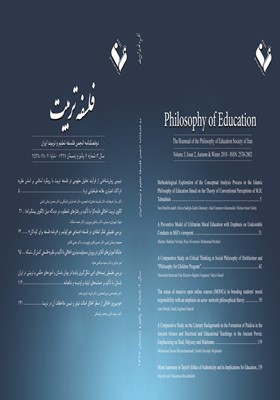الگوی تربیت اخلاقی فایدهگرا با تأکید بر رفتارهای نامطلوب در دیدگاه میل (الگوی پیشگیرانه)
محورهای موضوعی :
شهناز شهریاری نیسیانی
1
,
رضاعلی نوروزی
2
*
![]() ,
محمد مشکات
3
,
محمد مشکات
3
1 - دانشگاه اصفهان
2 - دانشگاه اصفهان
3 - دانشگاه اصفهان
کلید واژه: میل, اخلاق فایدهگرا, رفتارهای نامطلوب, تربیت اخلاقی, الگوی پیشگیرانه,
چکیده مقاله :
هدف پژوهش تدوین الگوی پیشگیرانه تربیت اخلاقی فایدهگرا با تأکید بر رفتارهای نامطلوب در دیدگاه میل است. روش بهکاررفته، توصیفی- تحلیلی است. بنا بر نتایج حاصله، رفتارهای نامطلوب شامل رفتارهای خطا (ناقض حقوق و آسایش دیگران)، و ناخوشایند است که وجودشان با توجه به قصور فرد در وظایف قابل تبیین است. هدف تربیت اخلاقی، خوشبختی، و تربیت اخلاقی در گستره موردنظر شامل ابعاد پیشگیری و مجازات است. مجازات به شکل مجازات قانونی و نکوهش بهعلت نقض حقوق و آشفته ساختن آسایش دیگران، و ازدستدادن حسننظر و ارتباطشان بهعلت رفتارهای فاقدمتانت شخصی نمود مییابد. اما منظور از پیشگیری، پیشگیری اولیه است که اصول حاکم بر آن، عدالت و تدبیراند. حاکمیت عدالت مربوط به رفتارهای ناقض حقوق اما حاکمیت تدبیر، در پیشگیری از هر دو رفتار خطا و در معنای مراقبت از نفس و مراقبت از استدلالهاست. در رفتارهای ناخوشایند اصل حاکم همان تدبیر با معانی پیشگفته است، که این یافتهها تأییدیاست بر عقیده میل که «بنیادهای زندگی اخلاقی در عصرجدید، عدالت و تدبیراند». راهبردهای پیشگیری بهتناسب دو نوع رفتار نامطلوب، شامل تقویت وجدان و راهبردهای آگاهیبخش و بصیرتافزا هستند که پیوندشان با اصول، در الگوی پیشگیرانه مشخص شده است. بر اساس ارزیابی یافتههای حاصل از پیشگیری، اگرچه لحاظ نمودن تنبیههای معقول برای رفتارهای خطا و توجه به عدالت و تدبیر در تبیین رفتارهای نامطلوب، از وجوه مثبت دیدگاه میل است، اما به عقاید وی درزمینه رفتارهای ناخوشایند نقد وارد است؛ زیرا مداخلهها و تنبیههای لحاظ شده برای این رفتارها ضمانت اجرایی لازم را ندارند تا به خود ضرر نزنند و دارندگان رفتارهای ناخوشایند را اصلاح کنند. همچنین عقیده وی در مورد دِین افراد نسبت به یکدیگر، فاقد پشتوانه اجرایی قوی برای عمل در رابطه با دارندگان این رفتارهاست، که رفع این ضعفها، نیازمند تجدیدنظر در اصل ضرر میل و تصحیح و ترمیم برخی عقاید اوست.
The purpose of this research is to formulate a preventive model of the utilitarian moral education with emphasis on undesirable conducts in Mill’s viewpoint. The method used is the “descriptive-analytical” method. Undesirable conducts include wrong conducts (violating rights and comfort of others), and unpleasant conducts, the existence of which can be explained with fails in duties. The goal of moral education is happiness, and moral education includes dimensions of prevention and punishment. Punishments appear in the following forms: reprobation for violating the rights and disturbing the comfort, and losing the positive attention of others because of the behaviors lacking personal dignity. By prevention, we mean primary prevention that is governed by the principles of justice and contemplation. The governance of justice is related to the conducts violating the rights, but governance of the principle of contemplation is in preventing wrong conducts, and in meanings of “care of soul” and care of reasons. In unpleasant conducts, the ruling principle is the contemplation with aforementioned meanings. These findings support Mill’s belief that "the main foundations of moral life in the new age are justice and contemplation." Prevention strategies referring to the two types of undesirable conducts are strengthening conscience and giving insights. The linkage of strategies to principles is presented in the preventive model. According to the findings on prevention, considering reasonable punishment for wrong conducts and paying attention to justice and contemplation in explaining undesirable conducts is a positive aspect of Mill's perspectiv. However, his views on unpleasant conducts have been criticized, because interventions and punishments considered for these conducts lack the necessary performance for guaranteeing the prevention of self-harm and reforming the holders of unpleasant conducts. Also his opinion about people's owing to one another lacks the strong executive support for action in relation to the holders of these conducts. Removing these weaknesses requires a revision of Mill's harm principle and correcting and reconsructing some of his beliefs.

